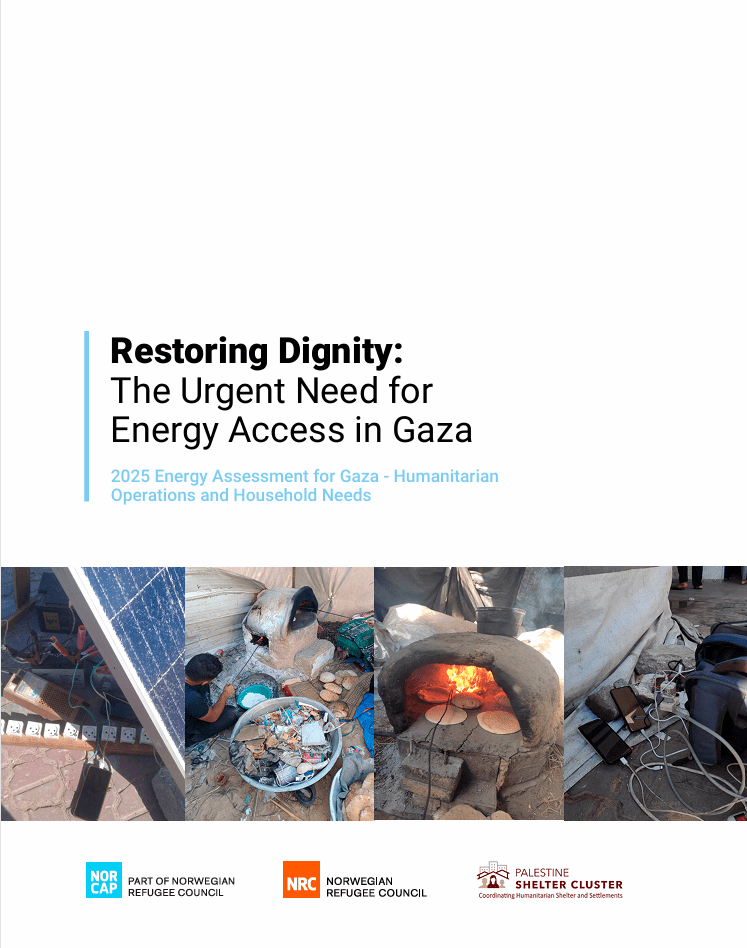Restoring Dignity: The Urgent Need for Energy Access in Gaza
 |
2025 Energy Assessment for Gaza - Humanitarian Operations and Household Needs
rapport Jun 2025 ; 55 pages
Aut. Frank Helbig & Hajar Al-Kaddo & Jonas Ekkeren Onsager
Ed. NRC - Oslo
Téléchargeable sous format: PdF
Téléchargeable chez l'éditeur
Résumé:
Gaza fait face à une crise énergétique critique, aggravée par un conflit prolongé et des destructions d’infrastructures, laissant 2,1 millions de Palestiniens avec un accès extrêmement limité à l’électricité — en moyenne seulement quatre heures par jour. L’effondrement quasi total du secteur énergétique de Gaza a gravement perturbé les services essentiels et exacerbé une catastrophe humanitaire déjà dramatique, nécessitant des interventions urgentes et ciblées pour éviter de nouvelles pertes humaines.
Cette évaluation énergétique souligne le rôle central de l’énergie dans la crise actuelle à Gaza, une situation aussi choquante qu’évitable. Le manque d’énergie — qu’il s’agisse d’électricité, de combustibles de cuisson ou de la capacité des générateurs — n’est pas dû à une rareté des ressources, mais résulte de restrictions persistantes et délibérées. Pour les Palestiniens qui tentent de survivre dans ces conditions, les services énergétiques de base nécessaires à la vie pourraient être rétablis relativement facilement, si l’accès leur était permis.
Ce rapport documente comment le refus délibéré d’accès à l’énergie, en particulier à l’électricité et aux combustibles de cuisson, compromet des besoins humains fondamentaux — tels que l’eau, l’assainissement, la santé et l’alimentation — laissant 70 % des foyers gazaouis sans accès fiable à une eau propre. Le gouvernement israélien et la communauté internationale doivent affronter les implications morales et éthiques de politiques qui aggravent une crise humanitaire déjà extrême. Abstract:
Gaza faces a critical energy crisis, exacerbated by prolonged conflict and infrastructure damage, leaving 2.1 million Palestinians with severely limited access to power and an average of just four hours of electricity per day. The near-total collapse of Gaza’s energy sector has severely disrupted essential services and escalated an already dire humanitarian disaster, demanding urgent, targeted interventions to prevent further loss of life. This energy assessment highlights the critical role energy plays in the ongoing crisis in Gaza, a situation that is as shocking as it is avoidable. The lack of energy—whether in the form of electricity, cooking fuels, or sufficient generator capacity—is not a consequence of scarcity but a result of persistent and deliberate restrictions. For Palestinians striving to survive under these conditions, the basic energy services required to sustain life could be restored with relative ease, if access were allowed. This report documents how the deliberate denial of energy access, particularly electricity, and cooking fuel, undermines fundamental human needs - including water, sanitation, healthcare, and food, leaving 70 per cent of Gazan households without reliable clean water access. The Israeli government and international community must confront the moral and ethical implications of policies that deepen an already dire humanitarian crisis. Contents:
1. INTRODUCTION 9
Background 10
Methodology 10
Assessment Limitations and Assumptions 14
2. GAZA’S ENERGY INFRASTRUCTURE IN CRISIS 15
Supply and Demand: Gaza’s Energy Gap 15
Impact of Energy Shortages on Essential Services 16
The Human Cost of Blackouts 17
3. ENERGY CHALLENGES FOR HUMANITARIAN OPERATIONS 19
Fuel-Dependent Activities in Humanitarian Aid 19
Sources of Electricity in Emergency Settings 20
Challenges in Addressing Energy Needs for Humanitarian Aid 22
Average Expenses for Energy in Humanitarian Operations 23
Key Findings and Recommendations for Humanitarian Energy 24
4. HOUSEHOLD ENERGY NEEDS AND BARRIERS 26
Barriers Preventing Access to Energy for the Affected Population 26
Energy for Household Cooking 28
Electricity Use in Households 35
Key Findings and Recommendations: Household Energy Solutions 41
5. PATHWAYS TO RECOVERY: STRATEGIC RECOMMENDATIONS FOR GAZA’S ENERGY 45
First Steps: Immediate Actions for Energy Recovery 46
Priority Needs: Energy Essentials for Post-Ceasefire Gaza 47
ANNEX: STAKEHOLDER MAP 51
Public-Cible:
Mots clefs: |
accès à l'énergie (CI) (DT) (OP) (ope) , humanitaire, urgentiste (CI) (DT) (OP) (ope) , services essentiels (CI) (DT) (OP) (ope) |
Pays concerné: |
Editeur/Diffuseur: |
|
NRC
-
Norwegian Refugee Council - Oslo - Norvège |
En cas de lien brisé, nous le mentionner à communication@pseau.org